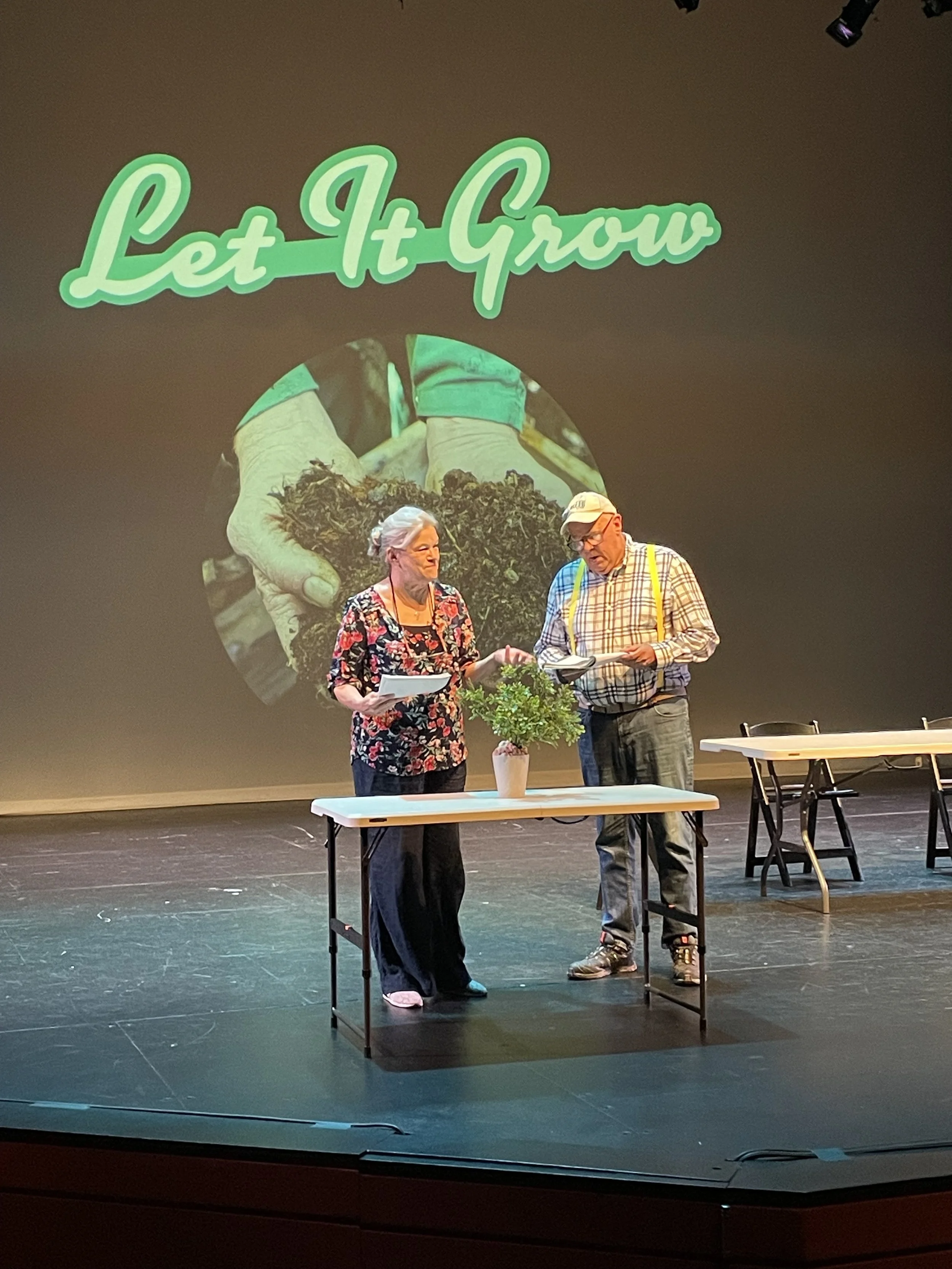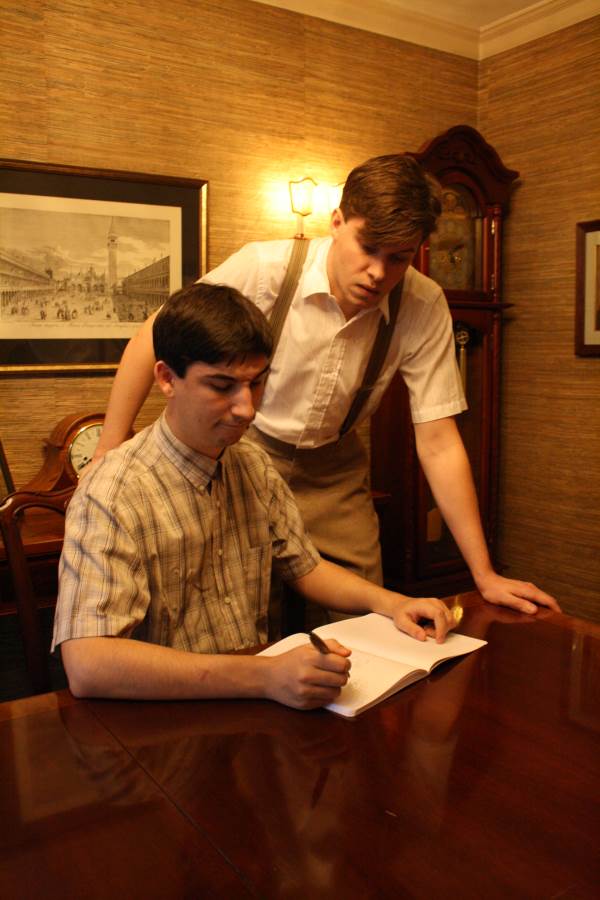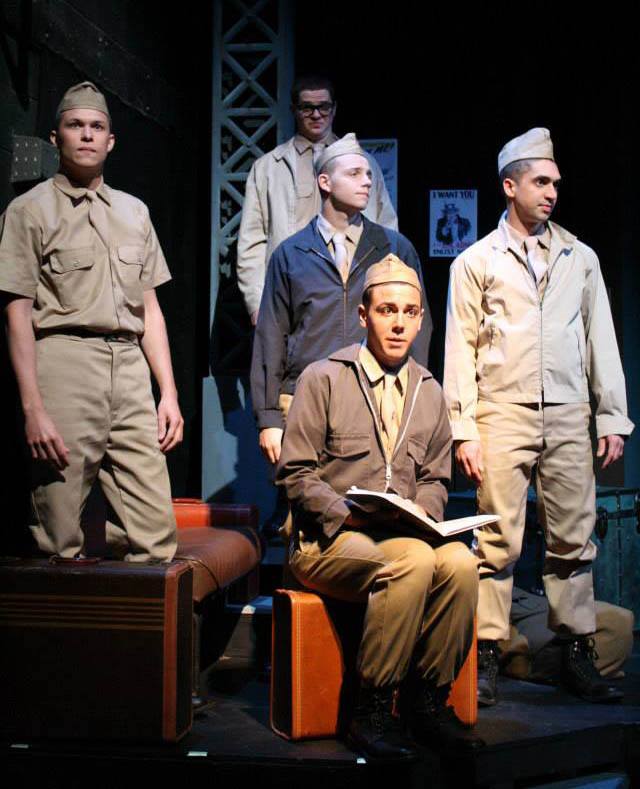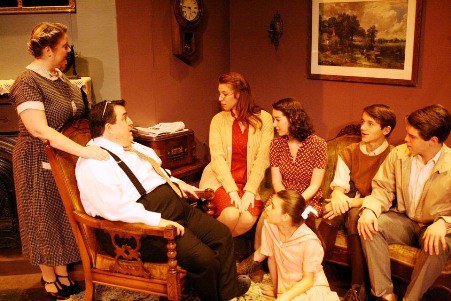So, here I am, about to eat dinner at Al-Amir restaurant in beautiful downtown Columbia, and prepare for one last, pre-tech run-through of Tom Stoppard’s Arcadia with the company of actors and artists at USC’s Theatre SC. We’ve been on quite a journey to get to this point. Having spent weeks reading, studying, and blocking the play in a rehearsal hall, and then having spent this week on stage at Drayton Hall as the set grew up around us, we are now on the verge of sharing this play with the public. As the show’s director, I couldn’t be more excited.

A little bit of background. I’ve been working as an actor, director, educator, and writer for the past 17 years. Back in 1998, I booked a job as an actor for a touring Shakespeare company which, at the time, was in residence at USC. For a couple of years, we would come to Columbia to rehearse, and then open our shows at the Koger Center before taking them all over the country. Those early years were very happy times, and it was through working for this company that I met director Robert Richmond, with whom I have continued to collaborate ever since, frequently at the Folger Theatre in Washington DC, where we have broken attendance and box office records, and been nominated for (and won!) several Helen Hayes Awards.
Here in Columbia, Robert and I created a theater piece based on Shakespeare’s Macbeth, called A Tale Told By An Idiot. A comic book-inspired mash-up of the Scottish play with the story of original English terrorist Guy Fawkes, it played at USC’s Lab Theater on Wheat Street, and featured the talents of USC undergraduate theater students. People loved it. Some years later, I founded a theater company, Psittacus Productions, in Los Angeles and chose A Tale Told By An Idiot as our inaugural show. Robert came out to direct, we opened as part of the first annual Hollywood Fringe Festival, then transferred to the Son Of Semele Ensemble Theater, where we sold out and extended. The press was excellent, and we received an LA Weekly Theatre Award for our efforts.
My point in all of this is that, for the past fifteen years, I have felt a deep connection to USC, to Theatre SC, and to the great city of Columbia. When department Chair Jim Hunter invited me back down to direct Arcadia, I jumped at the opportunity.
For me, Tom Stoppard’s Arcadia is a very special play. To begin, it appeals to two very distinct parts of who I am, both as an artist and as a human being, about which more will follow.

In the play, we encounter two sets of characters inhabiting the same drawing room in anestate on the English countryside. The first set is living in the year 1809. We meet a brilliant 13-year old girl, her randy tutor, her elegant mother, and various hangers-on. The whole household is scandalized – one of the guests, a minor poet, has been cuckolded by the tutor. There are allegations, handwritten challenges to duels, love notes passed, all while the young girl makes an important mathematical discovery, many years before the rest of the world would catch up. Additionally, everyone is in a tizzy because of a visit from that most famous of Romantics, Lord Byron, who is lurking, offstage, throughout the show.
The second set of characters live in the year 2013 – or, at least, in “the present day.” Here on the estate, we meet the noble descendants of the family from 1809. There are three siblings – a twenty-something male who is an Oxfordian mathematician, a saucy teenaged girl, and a fifteen-year-old boy who hasn’t spoken since age 5. Visiting the family, to research her next book, is a thirty-something author. Into this idyll charges a hotheaded, fame-hungry professor in his late thirties. He believes he is on the verge of a new discovery that will shake the foundations of English literary studies, particularly on the subject of Lord Byron. Gradually, the artifacts left behind from 1809 start showing up in 2013, and we watch the present day characters getting quite a few of the details wrong…while inching ever closer to the truth.

Certainly, the play is populated by very intelligent, hyper-articulate people, who spend quite a lot of time talking – about theory, about math, about landscape gardening, about art, about poetry. More interestingly, though, they also discover that no matter how sure one may seem about their place in the world, it is love – and lust, and the terrifying un-knowability of other people – that throws a wrench in the works every time. As the mathematician Valentine says in the play, these things are “the attraction that Newton left out.” They are the flies in the ointment of a deterministic universe governed by “free will.”
As I said, this appeals to me personally in two ways. First of all, I am a pretty huge nerd. I love teasing apart big ideas. I love intellectual sparring and heated conversation. I love to read, and I love to research. That said, I am also an actor and a flesh and blood male. As follows, I also love the irrational. I know what it is to feel swept up with passion. I know what it is to run away with the circus. This play presses both of those buttons for me, and I hope that it will for you, too.
“Well, good for him,” you might think in reading along. “But so what?”
My point, I suppose, is to say that, in coming to direct this play – or, in fact, any play – one must find a point of entry. One must attempt to answer the question “why produce this play, and why now?” In the current climate of economic fragility, global unrest, mass shootings, a shrill and polarized news media, and a deadlocked government, why would one choose to put on a play that is simultaneously a “big idea” play, and a classic English farce?
There are two potential ways of answering that question, one of which is complex, and one of which is…less complex.
The complex, or at least the “literary” answer goes something like this: Stoppard, particularly in this play, reminds me of two literary titans from the history of drama, Shakespeare and Chekov. To be a bit reductive, both of those playwrights were conversant in creating drama during times of – and through the lens of – great social upheaval. Shakespeare wrote sprawling, imaginative plays against the backdrop of Elizabethan England, a place full of religious conflict, wars against the Spanish, bouts of plague, and a linguistic explosion. Chekov wrote stories about families languishing at a remove from society and, ultimately falling apart, in the years directly preceding the Russian Revolution. Both playwrights are concerned with people wrestling with lofty ideas while simultaneously unable to escape some of the baser parts of their own humanity.
At nine years old, Stoppard, a Jewish, Czech national, moved to England with his mother and English stepfather who, according to the stories once said to young Tom, “Don’t you realize I made you British?” Having been displaced by World War II, and having embraced England, and indeed Englishness, Stoppard has created a literary world that is characterized by rapid-fire wit, philosophizing, and issues of human rights, censorship, and political freedom. And sex.
As for his literary debt to Chekov, one might consider his play cycle, “The Coast of Utopia, which addresses social philosophy in pre-Revolutionary Russia and won the Tony Award for Best Play. As far as Shakespeare goes, I suggest that one re-watch the movie Shakespeare In Love, for which Stoppard won the Academy Award for Best Original Screenplay.
Intimidated yet? I certainly was!
Here’s the less complex answer. This play is really, really fun. Yes, it’s very talky. Yes, it’s very heavy on ideas. Yes, it isn’t packed with a huge amount of “event.” Sounds a bit like an episode of Seinfeld, no?
Seriously, though. When I think about the question of “why this play, and why now?” I keep returning to the Internet. One of the things that sets our little moment on earth apart from any other throughout all of history is the presence of the Internet – not just in our lives, but in our pockets, and on our nightstands, 24 hours a day, every single day.
When I think of my own propensity to click along, chasing a notion or idea from link to link, from graphic to video to article to image, ad nauseum – it reminds me of following Tom Stoppard’s characters as one idea leads to the next, and we bounce between 1809 and the present day, until those worlds collide and overlap in the last scene of the play.
And yet…this is a piece of theater. For me, what the theater does, that no other art form does, is bring a whole bunch of strangers together in real time, under one roof, to trade these ideas with artists themselves. We’re all breathing the same air. You can see and hear us, to be certain. But we can also see and hear you. You impact our performance. Moreover, without you, we simply couldn’t make this work of art come to life at all. In short, theater, by its very definition, needs you to be there with us.
I suppose that’s a really long-winded way of gently pleading with you to buy a ticket to see our show. We’ve all become sort of fascinated by the weird, time-traveling world of this play, and have started seeing little idea nuggets from this play everywhere we look – be it noticing the way the beautiful tendrils of milk stir into uniform color and heat in a coffee at Cool Beans, or the way the tree trunks extend to branches and into leaves and into veins-in-leaves ad infinitum while strolling along the Horseshoe.
You might like our show, or you might find it a spectacular bore. Regardless: if we can all share a few laughs, and you come away with some food for thought, and some things you might want to chat about with friends afterwards, or Google when you get home, then the experiment was worthwhile.
Won’t you come experiment with us?
To close, I’ll just say that working on this play has made me obsessed with fractals. I’m not a good enough writer to unpack fractal theory here, so I’ve included a link to a video animation (click HERE.) In short, fractals are at the heart of the theory that our 13-year old girl discovers in 1809, and that our mathematician in 2013 extrapolates.
The video is another metaphor for Arcadia. Sometimes seeing a thing unfold makes more intuitive sense than hearing some nerdy director talk about it. So, click this link, and watch this video animation of fractals. If it exhilarates you, then you should definitely come and see our show.
Thanks for reading! See you at the theater!
~ Louis Butelli

Born and raised on Long Island, New York, Louis has spent the past seventeen years working as an actor, teacher, director, and writer. From 1998-2008, he was Artist-In-Residence and Company Clown for the Aquila Theatre Company. During that time, he played in over 25 productions of the works of William Shakespeare and other classical playwrights, appearing Off-Broadway, at major regional houses, on tour in the US to 49 states and across Europe; taught over 300 masterclasses; wrote, adapted and appeared in a new production of Stevenson’s Dr. Jekyll & Mr. Hyde. Other credits include Folger Theatre; La Jolla Playhouse; LA Shakespeare Festival; Shakespeare Theatre Co, DC; Alabama Shakespeare Festival; Yale Rep; Long Wharf; Orlando Shakes; Pasadena Playhouse; Two River Theater, NJ; Alpine Theater Project, MT; Seaside Shakespeare of Nantucket; La Scala Opera’s West Side Story in Milan, Beirut, Nagoya, Fukuoka, Osaka, and Tokyo; many others. TV: The Unusuals, and All My Children (ABC), Law & Order, and L&O: Criminal Intent (NBC). He is co-founder and Executive Director of Psittacus Productions, for whom he has produced A Tale Told By An Idiot (LA Weekly Theater Award), and CYCLOPS: A Rock Opera (NYMF Award for Excellence, 3 LA Weekly Award Nominations, Pulitzer Prize Juror Nominee) which played a sold-out and extended run at the 2011 New York Musical Theatre Festival, and the World Premier of the company’s latest show, A True History, which had a workshop at the Obie Award-winning Vineyard Theatre in New York City. He is honored every day he is able to go to work in the service of a great story.
Arcadia opens Friday, September 27 at USC's Drayton Hall Theatre, and runs through Saturday, October 5. Show times for Arcadia are 8 PM Wednesdays-Fridays, 7 PM Saturdays and 3 PM on the first Sunday. Tickets for the production are $12 for students, $16 for USC faculty/staff, military personnel and seniors 60+, and $18 for the general public. Tickets can be purchased in advance by calling 803-777-2551 or by visiting the Longstreet Theatre box office, which is open Monday-Friday, 12:30 -5:30 PM. Drayton Hall Theatre is located at 1214 College St. For more information, contact Kevin Bush at 803-777-9353, or bushk@mailbox.sc.edu.
Cast in this production are graduate acting students James Costello, Kate Dzvonik, Trey Hobbs, Josiah Laubenstein, Cory Lipman, Melissa Reed, Laurie Roberts and Leeanna Rubin, as well as undergraduate students Jason Fernandes, Grayson Garrick and Liam MacDougall. Acting instructor David Britt will also appear in the production. Graduate students Xuemei Cao and Sean Smith will design the set and costumes, respectively. Guest artist Baxter Engle will create the sound design. Instructor Eric Morris will design lighting. Guest artist Todd Stuart will craft the show's intricate props.






























